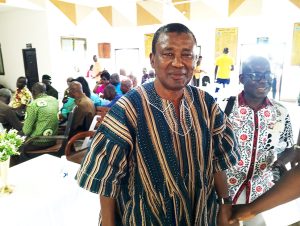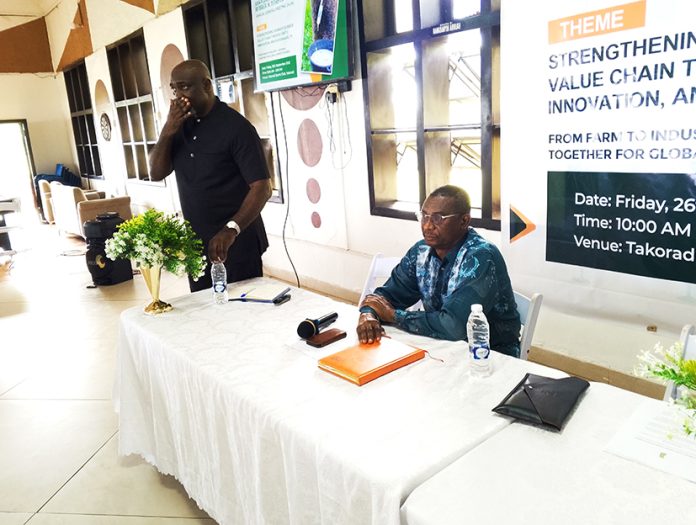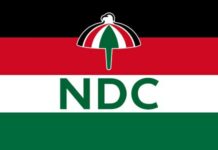Prominent industry leaders and traditional authorities are calling for an immediate ban on the export of raw rubber from Ghana, citing severe shortages faced by local processors and the threat it poses to the country’s industrialization agenda.
The Vice President of the Western Regional House of Chiefs (WRHC) and Omanhene of Lower Dixcove, Nana Kwesi Agyemang XI, has led renewed calls for urgent action to protect local rubber processors.

Speaking at the Annual General Meeting (AGM) of the Association of Natural Rubber Actors of Ghana (ANRAG) in Takoradi recently, he expressed concern over the growing export of raw rubber while local factories struggle to access raw rubber.
“The House is very concerned. We are aware of the shortage of raw rubber for local processors, and we believe there should be no export until there is enough supply locally.
“We are considering a formal engagement with the Minister for Trade, the Minister for Lands and Natural Resources, and other stakeholders to address this,” he said.
He cited the case of Ghana Rubber Estates Limited (GREL), which has been forced to reduce operations from a three-shift system to just one due to raw material shortages.
“This situation underlines the urgent need for a policy review,” he added.
Echoing similar concerns, Edward Kareweh, former General Secretary of the General Agricultural Workers Union (GAWU) described the export of raw rubber as a strategic failure.
Speaking during a panel discussion on Channel One TV he stressed that Ghana cannot achieve meaningful development by continuing to export raw materials.
“There is already enough processing capacity in the country to handle all rubber produced,” Kareweh said and argued that “Exporting raw rubber denies our processors the inputs they need to function. It simply does not make sense.”
He also criticised the Tree Crop Development Authority (TCDA), accusing it of standing by while the country’s industrial potential was being undermined.
“If TCDA’s role is to facilitate raw rubber export, then we are heading in the wrong direction. Their mandate should be to promote local value addition,” he asserted.
AGI Raises Alarm
Seth Twum-Akwaboah, Chief Executive Officer of the Association of Ghana Industries (AGI), added his voice to the growing chorus, questioning why raw rubber exports are allowed while domestic processors are left starving.
“If there is a ban on raw rubber exports, then it must be enforced. If not, then we must introduce one and implement it effectively,” he said. He called for the formation of a task force including security agencies, industry players, and TCDA to curb illegal exports.
Industry’s Untapped Potential
At the AGM, President of ANRAG, Emmanuel Akwasi Owusu, acknowledged the numerous challenges facing the natural rubber sector, including volatile pricing, limited investment in processing, and new compliance standards such as the EU’s Deforestation Regulation (EUDR).
“Despite the challenges, the opportunities are vast—from value addition and export diversification to environmental sustainability and community wealth creation,” he noted. “ANRAG was formed to advocate for the welfare of smallholder farmers and processors, attract investment, and position Ghana as a competitive global player in rubber.”
In a speech delivered on behalf of the CEO of the Tree Crop Development Authority, Andy Osei Okrah, the authority acknowledged the rubber sector’s growing importance and the resilience of industry players.
He identified market volatility and price fluctuations as ongoing issues and stressed the need for strict compliance with regulations. “All actors in the value chain must be registered and licensed. Export permits issued by TCDA are mandatory for all shipments—processed or unprocessed,” he emphasized.
He announced plans to introduce a traceability and conveyor certificate system, which will ensure accountability and allow every kilogram of rubber to be tracked from plantation to port.
Mr. Okrah reaffirmed TCDA’s commitment to supporting local processing. “Production alone is not enough. To unlock the full potential of the rubber sector, we must prioritise value addition and industrialization. The true wealth of rubber lies in finished goods, not raw exports,” he said.
He also urged ANRAG and its members to engage the TCDA directly on industry issues rather than resorting to media advocacy, promising the Authority’s openness to constructive dialogue.
Conclusion
As the debate over raw rubber exports intensifies, stakeholders across Ghana’s rubber value chain appear united in one message: value addition must take precedence over raw commodity exports.
Whether policy action follows swiftly remains to be seen, but the pressure on government and regulators is now undeniable given that stakeholders across the sector continue to advocate for immediate policy action to protect the local rubber industry from collapse, with consensus growing around the need for a temporary or outright ban on raw rubber exports.
The Western Regional Minister Joseph Nelson, the Association of Ghana Industries (AGI) and the Association of Natural Rubber Actors of Ghana (ANRAG), together with Association of Rubber Processors (RUPAG) have all condemned the recent rampant export of raw rubber whilst local processors continue to struggle with raw materials.
For ANRAG, Ghana loses an estimated $100 million in forex due to export of raw rubber.









